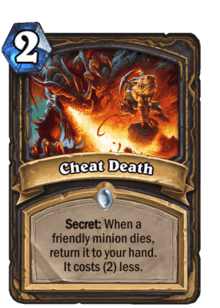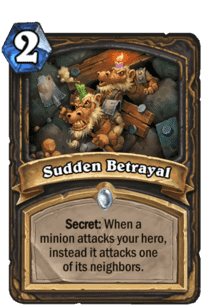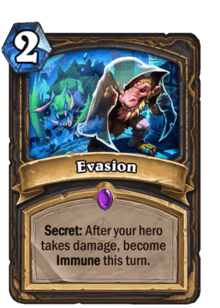Rogue Secrets
Table of Contents
Secrets are spells that, when played, place a buff on the casting hero. This buff remains active until a specific action occurs, at which point the Secret is triggered, causing its effect, and being consumed.
While your opponent can see when you play a Secret (the question mark icon that appears next to your hero's portrait will be visible to them as well as to you), they cannot see which Secret has been played. All Secrets have the same mana cost within each class, meaning that the amount of mana you used on the Secret cannot indicate to your opponent what Secret has been played.
While multiple Secrets can be active on a hero at the same time, only one instance of each Secret can be active at once.
It is important to note that Secrets can only be triggered during your opponent's turn.
This article will present the Secrets, their mechanics, as well as how to counter them and how to play them most efficiently.
Rogue Secrets and Their Mechanics
Rogue picked up its first three Secrets in Kobolds & Catacombs, making it the fourth class in Hearthstone to add Secrets to their repertoire. Rogue Secrets cost 2 Mana (the same as Hunter Secrets) and are marked by a black icon while in play.
Given the limited number of Rogue Secrets which are currently in the game, it is much easier to play around Rogue Secrets than it is to play around Paladin, Hunter, and Mage Secrets. Only two of the three Rogue Secrets are currently considered viable in constructed (Cheat Death and Evasion) and Arena (Cheat Death and Sudden Betrayal), making the decision tree for playing against Rogue Secrets relatively small.
How They Are Triggered
Cheat Death
Cheat Death is triggered when your first friendly minion dies. It will return that minion to your hand with its Mana cost reduced by 2.
Sudden Betrayal
Sudden Betrayal is triggered when an enemy minion attacks your hero. If that minion had any neighbors, it will attack one of those neighbors at random instead of attacking your Hero. Sudden Betrayal will not trigger if your opponent has only one minion in play.
Evasion
Evasion is triggered the first time your Hero takes damage. After you receive the damage, it will make your hero Immune for the remainder of the turn.
Countering/Detecting Rogue Secrets
Cheat Death
Cheat Death does not see very much play in constructed decks, making it quite easy to play around on the competitive ladder. If there are multiple minions on the board, simply kill your opponent’s worst minion first to play around Cheat Death. If your opponent has only one minion on board which you would rather not return to their hand (perhaps because it has a powerful Battlecry or Combo ability), you can often play around Cheat Death by ignoring this minion and applying pressure to your opponent’s life total.
Sudden Betrayal and Evasion
You can test for Sudden Betrayal and Evasion by attacking your opponent's face with a minion. You should attack face with your least important minion first if you suspect your opponent has Sudden Betrayal in play, while you should attack with your strongest minion first if you suspect your opponent has an Evasion in play.
Though it might sound difficult to determine if you should play around Sudden Betrayal or Evasion, these two Secrets have competing agendas and will rarely be found in the same deck. Evasion is only played in combo decks, while Sudden Betrayal makes the most sense in midrange decks. It is generally best to attack face with your biggest minion first to play around Evasion in constructed, and your smallest minion first to play around Sudden Betrayal in Arena.
Using Rogue Secrets Effectively
Sudden Betrayal
Sudden Betrayal is most effective when your opponent has no weak minions in play. The dream with Sudden Betrayal is to kill two of your opponent’s minions with it, which you can occasionally set up with spells and minion attacks by ensuring that all of your opponent's minions have more attack than their neighbors have health.
Try to avoid playing Sudden Betrayal when your opponent has very weak minions in play. You will not get much value from the card if your opponent is able to attack face with a 1/1 (such as Silver Hand Recruit), so it is generally best to try to wait until you can guarantee that Sudden Betrayal is capable of killing or nullify an attack from a stronger minion.
Cheat Death
Cheat Death is a useful tool for combo-style Rogue decks that are looking to get multiple Battlecry or Combo triggers from their minions. It can also be used to ensure a key minion (such as Gadgetzan Auctioneer) can be reused on a future turn at a discounted mana cost.
To get the maximum amount of value from your Cheat Death, try to only play this card when you have no bad minions in play. Your opponent can always kill your worst minion first to play around this Secret, but if you have no "worst" minions in play then your opponent will be forced to trade into one of your strong ones.
Evasion
Evasion is best played when it can prevent lethal damage (or gain you a substantial amount of life), which means it is best to wait on playing Evasion until the late game. It is important to remember that Evasion will not prevent lethal if your opponent has a source of damage which is capable of killing you in one shot, so try to avoid playing it until after your opponent has presented a threatening board but before they have taken total control over the game. This “not too soon, not too late” dynamic with Evasion makes it the trickiest of the three Rogue Secrets to use correctly.
Changelog
- 22 Dec. 2017: Guide added.
- Hearthstone Brings StarCraft and Major Updates in 2025
- Blizzard at Gamescom 2024
- Icy Veins Seeking Writers for Zenless Zone Zero: Apply Today!
- No BlizzCon in 2024
- Blizzard Games Return to China: New Agreement Signed With NetEase
- Blizzard Reportedly Reuniting with NetEase to Bring Back WoW in China
- Ex-Activision Blizzard CEO Bobby Kotick Shows Interest in Buying TikTok
- Timeline of Blizzard Presidents


